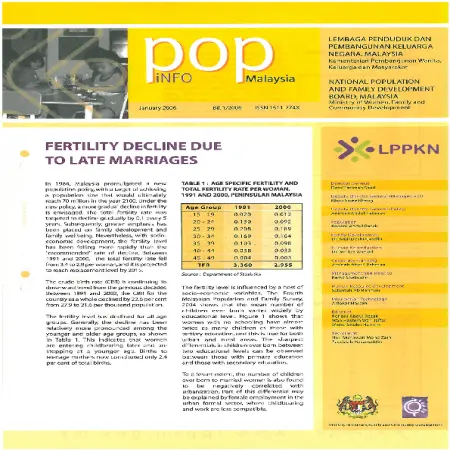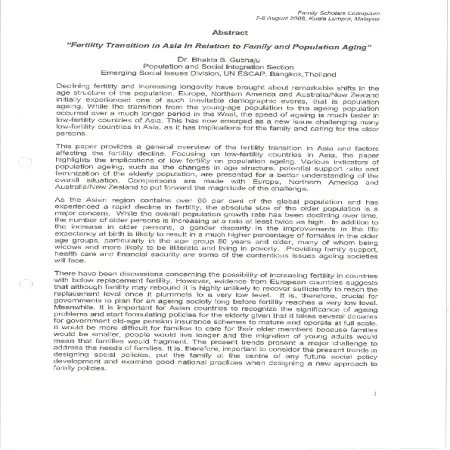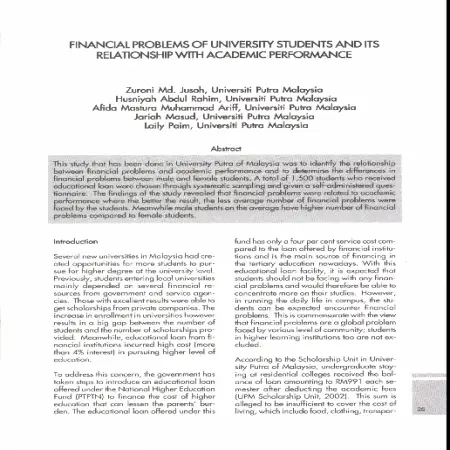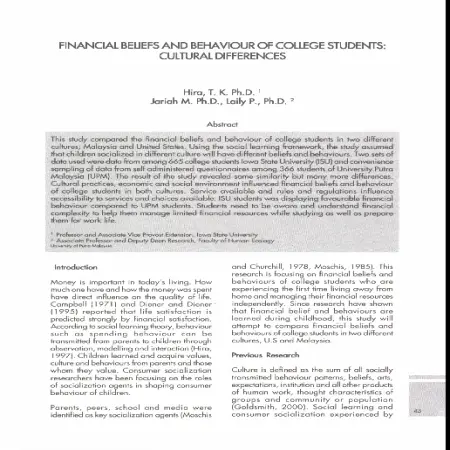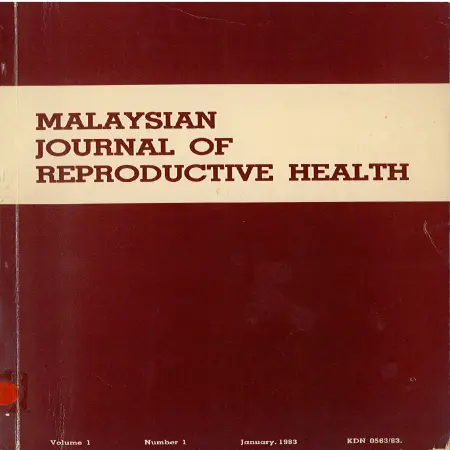PUBLICATIONS
|
|
Fertility decline due to late marriages
Item Type: Newsletter
Editor:
Year: 00/01/2006
Abstract: Rising education, delayed and non-marriage will become more prevalent. Marriage postponement shortens childbearing span, and it will result in further fertility decline. Changes in marital structure have significant implications on the family system and the care of older persons. With rising age at marriage and consequently delayed childbearing , many retirees are still supporting children who are studying in institutions of higher learning.
|
|
|
|
|
|
Fertility transition in Asia in relation to family and population aging
Item Type: Conference or Workshop Item
Editor:
Year: 00/00/2006
Abstract: Declining fertility and increasing longevity have brought about remarkable shifts in the age structure of the population. Europe, Northern America and Australia/New Zealand initially experienced one of such inevitable demographic events, that is population aging. While the transition from the young-age population to the aging population occurred over a much longer period in the West, the speed of aging is much faster in low-fertility countries of Asia. This has now emerged as a new issue challenging many low-fertility countries in Asia, as it has implications for the family and caring for the older persons. This paper provides a general overview of the fertility transition in Asia and factors affecting the fertility decline. Focusing on low-fertility countries in Asia, the paper highlights the implications of low fertility on population aging. Various indicators of population aging, such as the changes in age structure, potential support ratio and feminization of the elderly population, are presented for a better understanding of the overall situation. Comparisons are made with Europe, Northern America and Australia/New Zealand to put forward the magnitude of the challenge. As the Asian region contains over 60 percents of the global population and has experienced a rapid decline in fertility, the absolute size of the older population is a major concern. While the overall population growth rate has been declining over time, the number of older persons is increasing at a rate at least twice as high. In addition to the increase in older persons, a gender disparity in the improvements in the life expectancy at birth is likely to be illiterate and living in poverty. Providing family support, health care and financial security are some of the contentious issues aging societies will face. There have been discussions concerning the possibility of increasing fertility in countries with below replacement fertility. It is, therefore, crucial for governments to plan for an aging society long before fertility reaches a very low level. Meanwhile, it is important for Asian countries to recognize the significance of aging problems and start formulating policies for the elderly given that it takes several decades for government old-age pension insurance schemes to mature and operate at full scale. It would be more difficult for families to care for their older members because families would be smaller, people would live longer and the migration of young adults would mean that families would fragment. the present trends present a major challenge to address the needs of families. It is, therefore, important to consider the present trends in designing social policies, put the family at the centre of any future social policy development and examine good national practices when designing a new approach to family policies.
|
|
|
|
|
|
Financial problems of university students and its relationship with academic performance
Item Type: Article
Editor:
Year: 00/01/2004
Abstract: This study that has been done in University Putra of Malaysia was to identify the relationship between financial problems and academic performance and to determine the difference in financial problems between male and female students. A total of 1,500 students who received educational loan were chosen through systematic sampling and given a self-administered questionnaire. The findings of the study revealed that financial problems were related to academic performance where the better the result, the less average number of financial problems were faced by the students. Meanwhile male students on the average have higher number of financial problems compared to female students.
|
|
|
|
|
|
Financial beliefs and behaviour of college students: cultural differences
Item Type: Article
Editor:
Year: 00/01/2004
Abstract: This study compared the financial beliefs and behaviour of college students in two different cultures; Malaysia and United States. Using the social learning framework, the study assumed that children socialized in different culture will have different beliefs and behaviours. Two sets of data used were data from 665 college students Iowa State University (ISU)and convenience sampling of data from self administered questionnaires among 366 students of University Putra Malaysia (UPM). The result of the study revealed some similarity but many more differences. Cultural practices, economic and social environment influenced financial beliefs and behaviour of college students in both cultures. Service available and rules and regulations influence accessibility to services and choices available. ISU students was displaying favourable financial behaviour compared to UPM students. Students need to be aware and understand financial complexity to help them manage limited financial resources while studying as well as prepare them for work life.
|
|
|
|
|
|
Family development module for Institutions of Higher Education
Item Type: Module
Editor:
Year: 01/12/2000
Abstract: The NPFDB has initiated a family development programme (MOPKITP) for students from Institutions of Higher Education. The Family Development Module will be offered through the co-curriculum programme. This Family Development Module Package is a combination of the NPFDB's existing modules, that is Permata Kasih, Youth Exploration, SMARTbelanja, SMARTSTART, Bahtera Kasih, Belaian Kasih, Mutiara Kasih and POP Community. The outcome of this collaborative effort with the Institutions of Higher Education will be a pool of student who are "trained facilitators". Hence the NPFDB will be able to use these students to further expand its family development programmes to the grassroots.
|
|
|
|
|
|
Female sterilization using filshie clip in private practice
Item Type: Article
Editor:
Year: 00/01/1983
Abstract: The findings of a trial clip female sterilization program in private practice in Malaysia is presented. The Filshie clips were successfully applied in 382 subjects. Complications encountered were minimal. Only one subject presented with an intrauterine pregnancy following sterilization (0.3 percent). The success rate was very high in the region of 99.7 percent. This study also strengthens the view that private practitioners can play a very important role in the delivery of family planning advice and services to the masses in developing countries.
|
|
|
|
|
|
Family and Health Survey in the Federal Territory and Petaling Jaya
Item Type: Research Report
Editor:
Year: 00/00/1977
Abstract: The main objectives of this study is to provide basic demographic data for the Federal Territory and Petaling Jaya, and to provide estimates of the family planning knowledge, attitude and practices and to identify measures to improve family planning services. The survey covered a total of 3,679 household in Federal Territory and Petaling Jaya.
|
|
|
|
|
|
Family planning acceptor survey
Item Type: Research Report
Editor:
Year: 00/00/1977
Abstract: The objective of this survey is to evaluate the on-going family planning programme and to identify factor that are helpful for the successful implementation of The National Programme in terms of better acceptance and continuity of contraception.This study covering a total of 3,750 family planning recipients who use the pill for years 1975,1976 and the first four months of 1977 and also some of those who make use of other modern methods. This study also involving 70 districts in peninsular Malaysia.
|
|
|
|
|
|
Family and health survey in the intensive input demonstration areas (IIDA II)
Item Type: Research Report
Editor:
Year: 00/00/1976
Abstract: The objective of this study is to subsequent evaluation to measure the impact of the integration of family planning and health services in rural areas. Some of the major findings in this survey are: 78% married below 20 years of age. The mean age at first marriage is 17 years old. One in five ever married women had two or more marriages.
|
|
|
|





